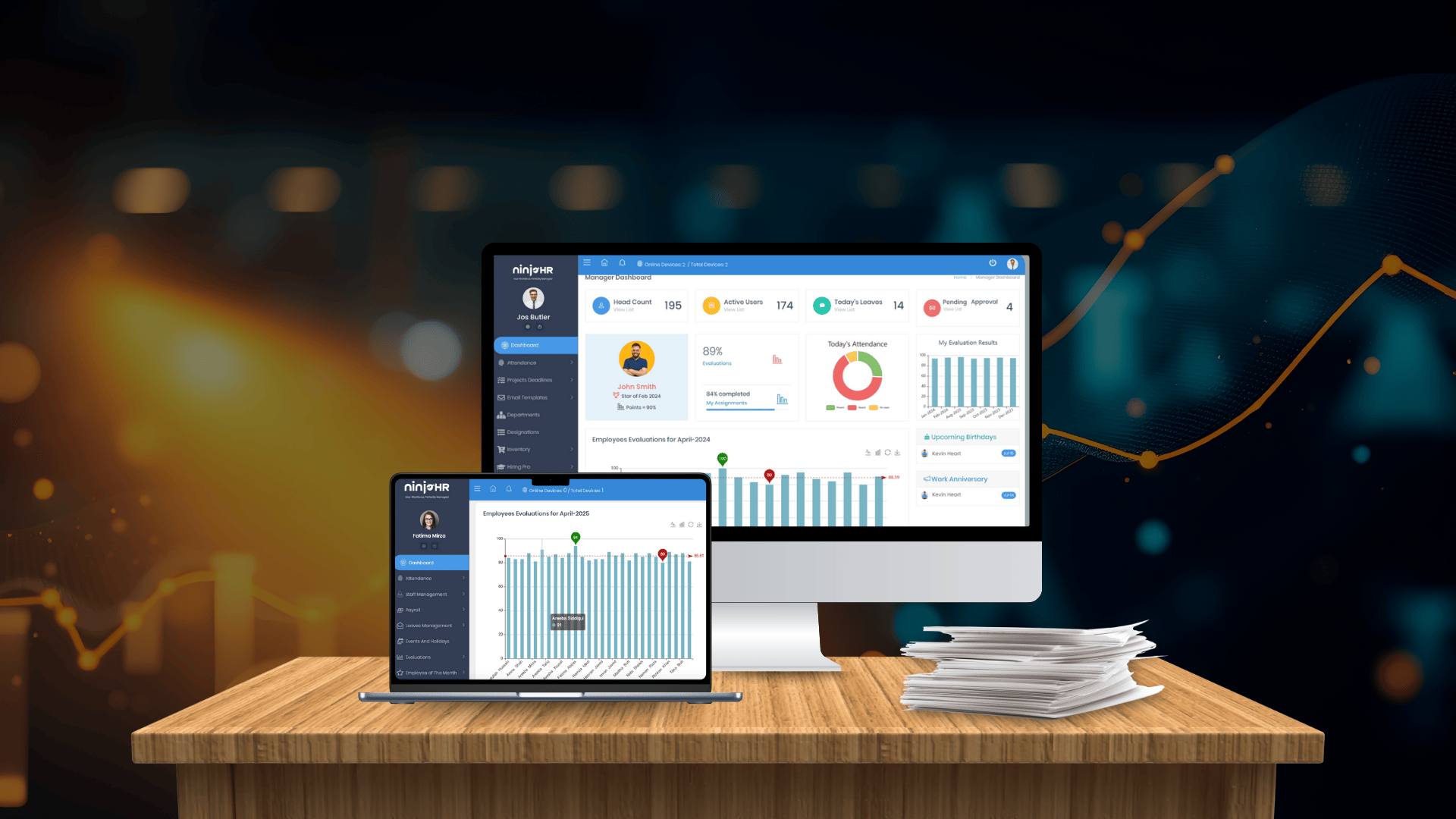- Manually processing payroll and attendance.
- Sending repetitive reminders for approvals or submissions.
- Tracking performance reviews and training progress manually.
- Filing compliance reports without automation tools.
Tag: HR productivity
-

How NINJA HR Takes Repetitive Tasks Off Your Plate for Good
How NINJA HR Takes Repetitive Tasks Off Your Plate for GoodEvery HR professional knows the struggle—endless spreadsheets, manual approvals, data entry, and repetitive emails. The daily grind of administrative work steals time from what really matters: building teams, improving culture, and driving business strategy. But what if your HR software could take those repetitive tasks off your plate—forever? That’s exactly what NINJA HR does. It’s not just another HR platform; it’s an automation powerhouse designed to free HR teams from mundane processes and help them focus on people, not paperwork. In this in-depth guide, we’ll explore how NINJA HR eliminates repetitive work, boosts efficiency, and transforms HR into a strategic function.The Problem with Repetition in HRRepetition may feel routine, but it’s also a silent productivity killer. When HR teams spend hours entering data, tracking leave balances, or sending the same email to new hires, creativity and strategy take a backseat. Studies show that HR professionals spend up to 40% of their week on administrative work—tasks that could easily be automated. These include:Enter NINJA HR: The Automation AllyNINJA HR is designed to remove repetitive work from your HR equation. By using smart automation, integrated workflows, and real-time analytics, it transforms HR departments into efficient, data-driven powerhouses. Whether you’re handling payroll, onboarding, or performance reviews, NINJA HR takes care of the repetitive backend work so your team can focus on strategy, innovation, and people engagement.Automating Payroll and AttendancePayroll is one of the most time-consuming HR functions. Manual data entry and spreadsheet calculations are prone to errors and compliance risks. NINJA HR automates every step—timesheet collection, overtime calculation, tax deductions, and payslip generation. With smart attendance tracking integrated into the platform, all payroll data flows seamlessly into salary processing without manual effort. The system even alerts HR when anomalies occur, ensuring full compliance and accuracy. What once took days can now be done in minutes.Simplifying Leave ManagementTraditional leave tracking is messy—emails, shared calendars, and manual approvals. NINJA HR simplifies this by automating the entire process. Employees can apply for leave via the self-service portal, and managers can approve with one click. The system automatically updates attendance records and payroll data. No back-and-forth emails, no missed entries. HR gets full visibility into leave balances and trends across departments, making reporting effortless.Streamlining Recruitment and OnboardingRecruitment often involves repetitive steps: posting jobs, screening resumes, sending offer letters, and collecting documents. NINJA HR automates these tasks through its integrated applicant tracking system. From publishing job openings to onboarding new hires, the platform keeps the process smooth and paperless. New employees receive automated onboarding tasks, digital forms, and welcome messages, ensuring a great first impression—without HR lifting a finger.Automating Performance ReviewsPerformance management shouldn’t mean chasing managers for review forms or manually calculating ratings. NINJA HR automates review cycles, sends reminders, and consolidates feedback into actionable insights. It can even generate performance reports instantly, helping HR identify top performers and improvement areas. The result? A fair, consistent, and data-backed evaluation process—without repetitive administrative effort.Managing Compliance AutomaticallyCompliance is a critical yet time-intensive area for HR. Filing returns, tracking policy changes, and managing audit trails require accuracy and attention to detail. NINJA HR automates compliance tasks by keeping all records organized and up-to-date. It tracks labor law changes, sends renewal reminders, and maintains a digital audit trail—so you never miss a deadline or risk non-compliance. What used to be stressful manual monitoring becomes a background process handled automatically.Data Centralization: No More Searching Across SpreadsheetsOne of the biggest sources of HR frustration is data scattered across multiple files and folders. NINJA HR solves this by centralizing everything—from employee records to performance history—in one secure cloud dashboard. With instant access and smart search, HR teams can retrieve any information in seconds. No more opening 10 Excel sheets to find one answer. This centralization not only saves time but also reduces errors caused by version mismatches or outdated files.Employee Self-Service: Empowering Without MicromanagingImagine employees updating their personal details, downloading payslips, and checking leave balances—without emailing HR. That’s the power of self-service. NINJA HR’s self-service portal empowers employees to handle routine requests independently. This reduces repetitive queries for HR and enhances transparency for employees. The result is a more efficient and empowered workforce.Real-Time Notifications and Smart RemindersRepetitive reminders—“Submit your timesheet,” “Approve leave requests,” “Update your goals”—are a daily reality for HR teams. NINJA HR automates all of these with smart reminders and real-time notifications. The system nudges employees and managers at the right time, keeping workflows on track without manual follow-ups. HR can finally say goodbye to chasing people over email.Analytics That Eliminate GuessworkRepetition doesn’t just waste time—it limits insight. When HR is buried under manual tasks, there’s little room for analysis. NINJA HR changes that by turning everyday data into actionable insights. Dashboards show trends in attendance, turnover, and engagement, helping HR spot issues early and make informed decisions. Automation frees up time; analytics amplifies impact.Scalability That Grows with YouAs organizations expand, manual HR processes simply can’t keep up. NINJA HR scales effortlessly—whether you have 20 or 2,000 employees. You can add new modules, customize workflows, and integrate with other business systems as you grow. That means no more starting from scratch every time your company evolves.Saving Hours—Every Single DayWhen automation takes over repetitive tasks, the results are transformative. HR professionals report saving up to 15–20 hours per week after implementing NINJA HR. Those are hours that can now go toward building engagement programs, developing leaders, or improving company culture. Less time spent on admin means more time creating value.Why NINJA HR Feels EffortlessUnlike complex enterprise software that requires months of setup, NINJA HR is built for ease. Its interface is intuitive, implementation is fast, and customer support is always available. Even first-time users can navigate effortlessly. It’s designed so that automation feels natural, not technical. Every feature has one goal: make HR’s life easier.Beyond Automation: Building a Future-Ready HR TeamAutomation is just the beginning. NINJA HR helps HR professionals evolve from administrators to strategists. By freeing teams from repetitive tasks, it gives them the bandwidth to focus on talent development, diversity initiatives, and business alignment. Instead of maintaining records, HR now drives results. This shift is what future-ready HR looks like—and it starts with technology that removes the repetitive burden once and for all.ConclusionRepetition has no place in modern HR. The more time spent on manual work, the less time HR has to make meaningful impact. NINJA HR eliminates those bottlenecks with powerful automation, intelligent insights, and a user-first design. From payroll to performance, every process becomes faster, easier, and more accurate. The result? An HR team that finally has the time to do what it was meant to do—lead. With NINJA HR, repetitive tasks are off your plate for good, and productivity is back where it belongs: in your hands. -

The Road to Success: How HR Promotes Innovation and Productivity
The Road to Success: How HR Promotes Innovation and ProductivityIntroduction
Innovation and productivity are essential drivers of business success. Companies that promote both tend to outperform competitors, stay relevant, and maintain a competitive edge in the market. Human Resources (HR) plays a central role in fostering an environment that promotes both innovation and productivity. By creating a supportive culture, offering the right resources, and providing opportunities for development, HR can help employees work smarter, think creatively, and deliver outstanding results. In this article, we explore how HR contributes to innovation and productivity in the workplace and how it helps guide the road to success.
The Importance of Innovation and Productivity
Innovation and productivity are essential elements for business growth. Innovation ensures that a company is adapting to changing environments and continuously improving its processes, products, and services. Productivity, on the other hand, maximizes output and efficiency, enabling the organization to deliver value consistently. Here’s why innovation and productivity are key to organizational success:
- Enhanced Competitiveness: Innovation helps businesses stay ahead of market trends, while productivity ensures that the company can deliver products and services efficiently and cost-effectively.
- Improved Employee Engagement: Employees who are encouraged to innovate and work efficiently are more engaged, as they feel empowered to contribute meaningfully to the company’s success.
- Increased Profitability: When innovation and productivity are optimized, companies can reduce costs, streamline processes, and increase profitability through improved performance.
- Attraction of Top Talent: Companies known for their innovation and productive work culture attract highly skilled employees who want to be part of forward-thinking organizations.
How HR Promotes Innovation and Productivity
HR is instrumental in shaping the culture of an organization to support both innovation and productivity. By implementing strategies that foster creativity, collaboration, and efficiency, HR can guide employees toward success. Here are several ways HR promotes innovation and productivity in the workplace:
- Encourage Creative Thinking: HR can offer training programs and workshops that encourage employees to think outside the box, challenge assumptions, and contribute innovative ideas.
- Provide Tools and Resources for Efficiency: HR can ensure employees have access to the right tools, technologies, and processes that enable them to work more productively and with greater ease.
- Foster a Collaborative Environment: By encouraging teamwork and cross-functional collaboration, HR can help employees bring diverse ideas together to create innovative solutions.
- Implement Recognition Programs: HR can implement employee recognition programs that celebrate both innovative ideas and high productivity, motivating employees to continue striving for excellence.
- Offer Professional Development: HR can provide learning and development opportunities that equip employees with the skills necessary to innovate and work efficiently, including leadership training, productivity tools, and creative problem-solving workshops.
Creating a Culture of Innovation and Productivity
For innovation and productivity to thrive, HR must cultivate a workplace culture that values both. Creating such a culture involves setting the right expectations, supporting continuous learning, and encouraging employees to take risks. Here’s how HR can build and nurture a culture of innovation and productivity:
- Define Clear Goals and Expectations: HR can work with leadership to set clear goals for innovation and productivity that align with the company’s overall mission and vision. This ensures that all employees understand their role in driving success.
- Encourage Risk-Taking and Experimentation: Innovation often involves trial and error. HR can create a safe environment where employees are encouraged to take risks, experiment, and learn from failures without fear of judgment.
- Provide Regular Feedback: HR can implement systems for giving regular feedback to employees on their performance. Constructive feedback helps employees refine their ideas and improve productivity, ensuring continuous growth.
- Support Work-Life Balance: HR can promote work-life balance by offering flexible work arrangements, wellness programs, and time-off policies. When employees are well-rested and maintain balance, they are more productive and creative.
- Celebrate Achievements: Recognizing and celebrating milestones and accomplishments, whether small or large, fosters a sense of pride and motivates employees to continue contributing to the company’s success.
Measuring Innovation and Productivity
To gauge the effectiveness of their efforts, HR should track and measure innovation and productivity levels across the organization. By using data and feedback, HR can identify areas for improvement and celebrate successes. Here are some methods for measuring innovation and productivity:
- Employee Feedback and Surveys: HR can conduct surveys and gather feedback from employees to assess their perceptions of innovation and productivity initiatives, helping HR understand what’s working and what can be improved.
- Innovation Metrics: HR can track metrics such as the number of new ideas submitted, patents filed, or projects completed to measure the organization’s level of innovation.
- Productivity Metrics: By measuring output, efficiency, and quality, HR can assess employee productivity and identify opportunities for improvement.
- Employee Engagement Surveys: HR can use engagement surveys to track how motivated and involved employees are in innovation and productivity efforts, which can be a strong indicator of a thriving work culture.

Work Smarter, Not Harder: HR’s Role in Boosting Productivity
Work Smarter, Not Harder: HR’s Role in Boosting ProductivityIntroduction
In today’s fast-paced business world, efficiency and productivity are crucial for success. While working harder is often seen as a way to achieve more, working smarter is the key to maximizing output without compromising employee well-being. Human Resources (HR) plays a critical role in creating an environment that encourages employees to work smarter, not harder. By providing the right tools, resources, and strategies, HR can help employees be more productive, engaged, and satisfied in their roles. This article will explore HR’s role in boosting productivity and how HR professionals can create a work environment that encourages smarter working practices for long-term success.
The Importance of Working Smarter, Not Harder
In a work environment that demands high performance, working smarter can often be more effective than simply working harder. While long hours and intense effort are often appreciated, they do not necessarily equate to better results. Smarter work focuses on efficiency, creativity, and time management. Here’s why working smarter is important for productivity:
- Improved Efficiency: Smarter work practices help employees focus on high-value tasks that have the most significant impact on results, leading to better use of time and resources.
- Higher Job Satisfaction: When employees are encouraged to work smarter, they can maintain a healthy work-life balance, reducing burnout and improving job satisfaction.
- Better Focus: Working smarter allows employees to prioritize critical tasks, avoid distractions, and stay focused, leading to higher-quality work in less time.
- Increased Innovation: Employees who have more time and mental space due to smarter work practices are more likely to think creatively and contribute innovative ideas.
How HR Can Foster a Smarter Work Environment
HR professionals are at the forefront of creating a culture that enables employees to work smarter. By implementing policies and strategies that promote efficiency, engagement, and well-being, HR can help optimize productivity in the workplace. Below are some key ways HR can foster smarter working practices:
- Encourage Time Management Skills: HR can offer workshops and resources to help employees develop time management skills, enabling them to prioritize tasks, set realistic goals, and manage deadlines effectively.
- Provide the Right Tools and Technology: HR can ensure employees have access to the right tools and technologies to streamline processes, automate repetitive tasks, and improve efficiency.
- Promote Work-Life Balance: Encouraging a work-life balance through flexible working hours, remote work options, and adequate time off allows employees to recharge, ultimately leading to higher productivity when they return to work.
- Foster Collaboration: HR can implement collaborative tools and encourage teamwork, which can help employees solve problems more quickly and share resources, leading to smarter and more effective outcomes.
- Offer Professional Development Opportunities: By providing employees with learning and development opportunities, HR helps them acquire new skills and strategies for working smarter. Training on efficiency tools, leadership, and productivity techniques can boost performance.
Building a Culture of Productivity
To truly foster a smarter work environment, HR needs to cultivate a culture of productivity that encourages employees to focus on meaningful work. A productive culture is one where employees feel motivated, supported, and equipped to succeed. Here’s how HR can help build this culture:
- Set Clear Expectations and Goals: HR can work with leadership to set clear expectations and achievable goals that align with the company’s mission. Well-defined goals provide employees with direction and purpose, making it easier to work smarter.
- Recognize and Reward Productivity: Implementing recognition programs that reward employees for working efficiently and achieving productivity goals fosters a culture where employees are motivated to maintain high performance.
- Encourage Continuous Improvement: HR can create an environment that values continuous learning and improvement. Encouraging employees to seek better ways to complete tasks, learn new skills, and innovate helps keep the work environment dynamic and productive.
- Provide Feedback and Support: Regular feedback from managers and HR helps employees identify areas for improvement and provides the necessary support to enhance performance. Constructive feedback encourages employees to work smarter by honing their skills and avoiding common pitfalls.
Overcoming Barriers to Smarter Work Practices
While working smarter can significantly enhance productivity, there are barriers that may hinder this shift. HR can help employees overcome these challenges by providing the necessary tools, resources, and support:
- Addressing Workload Issues: If employees feel overwhelmed by excessive workloads, HR can help redistribute tasks, offer additional support, or hire extra help to ensure that employees aren’t stretched too thin.
- Reducing Workplace Distractions: HR can implement policies that limit distractions, such as noise, interruptions, and unnecessary meetings, allowing employees to focus on the task at hand.
- Eliminating Redundant Tasks: HR can help identify and eliminate repetitive, low-value tasks that waste time and reduce efficiency. By streamlining processes, employees can focus on high-impact activities.
- Improving Communication: HR can introduce communication tools and protocols that improve collaboration and reduce misunderstandings. Efficient communication ensures that employees can work smarter by accessing the information they need quickly.